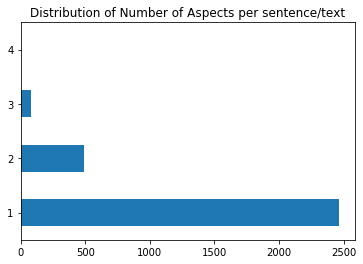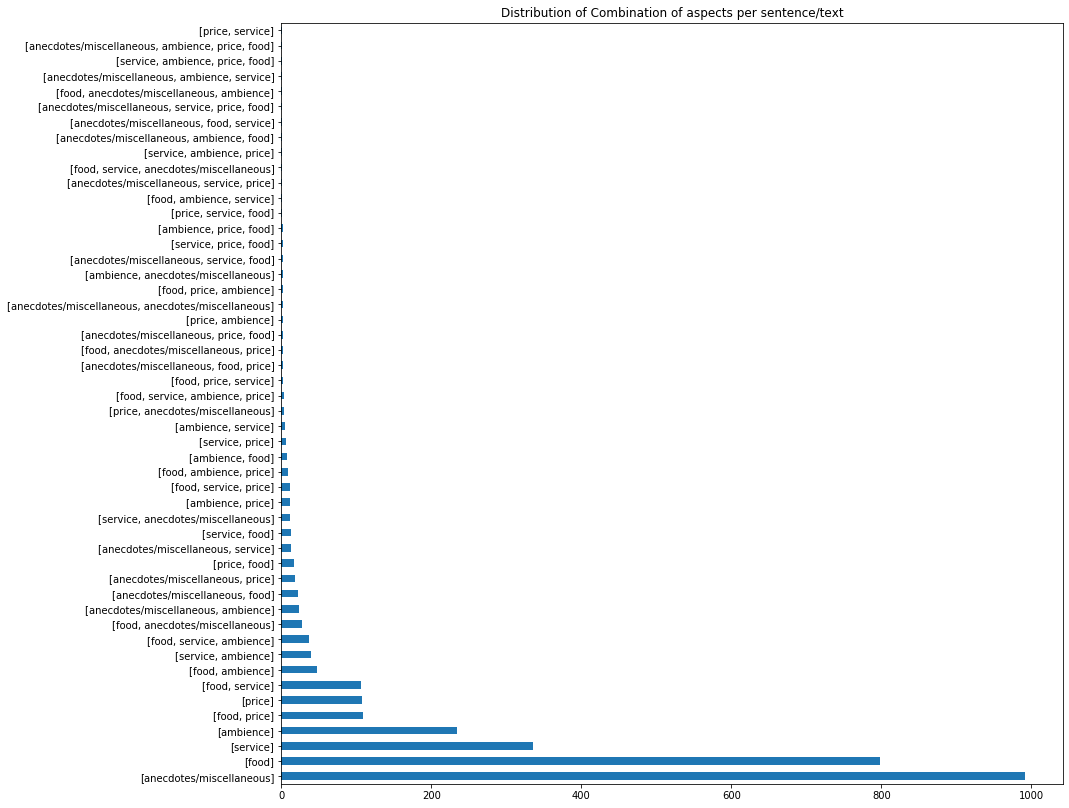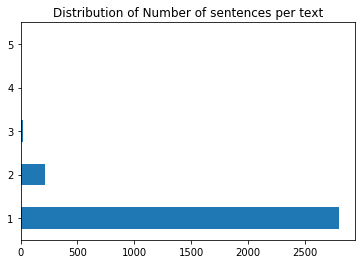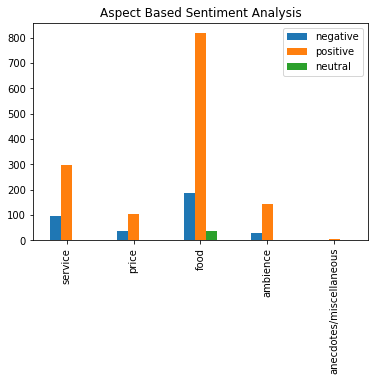Simple Unsupervised Aspect Based Sentiment Analysis
Aspect based sentiment analysis is quite popular and useful task in NLP. It’s widely used for analysing social media posts. It’s extension of sentiment analysis which analyses sentiments of specific aspects. Getting insights of very specific aspects is more useful for product owners and it helps them to analyse every feature and part of their product, then improve them.
Problem:
Given collection of social media posts and user opinions also aspect categories and it’s required to analyse sentiments for each aspect category. We take an example of restaurant reviews dataset with 5 aspect terms: [ambience, anecdotes/miscellaneous, food, price, service].
Solution:
Solution is pretty simple and fully unsupervised which means that there is no model training required! We use spaCy library with it’s extension neuralcoref. They are completely enough for make it work. Here we use word2vec embeddings from spaCy for matching candidate terms from sentences to aspects (classification of aspect terms) and dependency tree parsing using spaCy to detect references of opinion words to aspect terms. Additional list of positive and negative opinion words list is used for classifying sentiments and further analysis of dependencies is used for polarity detection (negations, verbs, adjectives of opinion words, etc).
Example Data:
<?xml version="1.0" encoding="UTF-8" standalone="yes"?>
<sentences>
<sentence id="3121">
<text>But the staff was so horrible to us.</text>
<aspectTerms>
<aspectTerm term="staff" polarity="negative" from="8" to="13"/>
</aspectTerms>
<aspectCategories>
<aspectCategory category="service" polarity="negative"/>
</aspectCategories>
</sentence>
<sentence id="2777">
<text>To be completely fair, the only redeeming factor was the food, which was above average, but couldn't make up for all the other deficiencies of Teodora.</text>
<aspectTerms>
<aspectTerm term="food" polarity="positive" from="57" to="61"/>
</aspectTerms>
<aspectCategories>
<aspectCategory category="food" polarity="positive"/>
<aspectCategory category="anecdotes/miscellaneous" polarity="negative"/>
</aspectCategories>
</sentence>
<sentence id="1634">
<text>The food is uniformly exceptional, with a very capable kitchen which will proudly whip up whatever you feel like eating, whether it's on the menu or not.</text>
<aspectTerms>
<aspectTerm term="food" polarity="positive" from="4" to="8"/>
<aspectTerm term="kitchen" polarity="positive" from="55" to="62"/>
<aspectTerm term="menu" polarity="neutral" from="141" to="145"/>
</aspectTerms>
<aspectCategories>
<aspectCategory category="food" polarity="positive"/>
</aspectCategories>
</sentences>
Notebook:
Install Requirements
!pip install pandas==1.0.3 \
scikit-learn==0.21.3 \
scikit-multilearn==0.2.0 \
neuralcoref==4.0.0 \
spacy==2.1.0 \
plotly==4.6.0 \
gensim==3.8.0 \
matplotlib==3.1.3 \
six==1.12.0 \
numpy==1.16.5 \
nltk==3.4.5 \
cython
Download large english model which has word embeddings
!python -m spacy download en_core_web_lg
Imports
%load_ext autoreload
%autoreload 2
%matplotlib inline
import pandas as pd
import os
import json
import re
import spacy
import matplotlib.pyplot as plt
import warnings
warnings.filterwarnings("ignore")
Retrieve dataset and parse
Dataset file is xml format. We will parse them using xml library
import xml.etree.ElementTree as ET
Download dataset file from github source link
if not os.path.exists('absa_data'):
!mkdir absa_data
if not os.path.exists('absa_data/Restaurants_Train.xml'):
!cd absa_data && wget https://raw.githubusercontent.com/LFCapollo/Aspect-Based-Sentiment-Analysis/master/data/Restaurants_Train.xml
parsing of xml to extract sentences, aspect terms, aspect categories and sentiment polarities
def parse_xml_data(root):
"""Parses xml data to extract aspect terms and aspect categories from each sentence"""
reviews = []
for sentence in root.findall("sentence"):
entry = {}
aspect_terms = []
aspect_categories = []
if sentence.find("aspectTerms"):
for aspect_term in sentence.find("aspectTerms").findall("aspectTerm"):
aspect_terms.append((aspect_term.get("term"), aspect_term.get("polarity")))
if sentence.find("aspectCategories"):
for aspect_category in sentence.find("aspectCategories").findall("aspectCategory"):
aspect_categories.append((aspect_category.get("category"), aspect_category.get("polarity")))
entry["text"] = sentence[0].text
entry["terms"] = aspect_terms
entry["aspects"] = aspect_categories
reviews.append(entry)
reviews_df = pd.DataFrame(reviews)
return reviews_df
tree = ET.parse('absa_data/Restaurants_Train.xml')
root = tree.getroot()
df = parse_xml_data(root)
df.head()
| text | terms | aspects | |
|---|---|---|---|
| 0 | But the staff was so horrible to us. | [(staff, negative)] | [(service, negative)] |
| 1 | To be completely fair, the only redeeming fact... | [(food, positive)] | [(food, positive), (anecdotes/miscellaneous, n... |
| 2 | The food is uniformly exceptional, with a very... | [(food, positive), (kitchen, positive), (menu,... | [(food, positive)] |
| 3 | Where Gabriela personaly greets you and recomm... | [] | [(service, positive)] |
| 4 | For those that go once and don't enjoy it, all... | [] | [(anecdotes/miscellaneous, positive)] |
EDA
We do simple exploratory data analysis. Data is much cleaner than usual but some additional cleaning can be applied for improving overall results.
Load spaCy english large model (en_core_web_lg - contains word embeddings also)
load spaCy english model
nlp = spacy.load('en_core_web_lg')
Count Records
We don’t have too much data. Just several thousand records
df.shape[0]
3044
Show sample values per column
Just to have a look at sample values from each column. As we see we have texts (one or more sentences, aspect terms and aspects with polarity values for both)
for column in df.columns:
print('='*50)
print(f'Column: {column.upper()}')
print('='*50)
print(f'Values: {df[column].sample(10).values.tolist()}')
print('-'*50)
==================================================
Column: TEXT
==================================================
Values: ['Oh yes, and they lie on the phone, claiming they have seating in the garden, then of course the seats are not available.', 'So my husband made up an excuse so we can leave.', 'My friends and I experienced amazing cheese and a delicious, new summer menu at Artisanal last night.', 'For those prices and the dressed up atmosphere you expect more and should get more.', "I'm no food critic, but I'd like to think I have a tiny bit of experience under my belt having lived in NY for the last 11 years.", 'If you go here - your focus should be the Tamarind Margaritas.', 'I cannot imagine better Indian food in all of the city.', 'A glass of Leaping Lizard, a glass of prosecco, and the mussels had everything happy.', 'The staff makes you feel at home, the food is great and the atmosphere is WONDERFUL!', 'Appetizers are somewhere around $7 each and the main dishes are between $11 and $16.']
--------------------------------------------------
==================================================
Column: TERMS
==================================================
Values: [[], [('Decor', 'positive'), ('food', 'positive'), ('wine list', 'positive'), ('food', 'neutral')], [], [('service', 'positive'), ('atmosphere', 'positive')], [], [('chef', 'negative'), ('staff', 'negative')], [('fish', 'negative'), ('rice', 'negative')], [('Tuscan cuisine', 'conflict'), ('Neapolitan fare', 'positive')], [('spot lights', 'negative')], [('price', 'negative')]]
--------------------------------------------------
==================================================
Column: ASPECTS
==================================================
Values: [[('anecdotes/miscellaneous', 'neutral')], [('anecdotes/miscellaneous', 'positive')], [('food', 'neutral')], [('price', 'positive'), ('food', 'positive')], [('anecdotes/miscellaneous', 'negative')], [('ambience', 'negative'), ('price', 'positive')], [('food', 'positive'), ('ambience', 'positive')], [('food', 'positive')], [('service', 'positive')], [('anecdotes/miscellaneous', 'positive')]]
--------------------------------------------------
Aspects
We have just 5 aspect that we need to analyse. (we see later that ‘anecdotes/miscellaneous’ is kind of hard to analyse with simplest approach and we skip that from evaluation)
set(df.aspects.apply(lambda x: [item[0] for item in x]).sum())
{'ambience', 'anecdotes/miscellaneous', 'food', 'price', 'service'}
Aspects distribution per text/sentence
We have mostly one aspect (sometimes 2 and 3) per text
df.aspects.apply(lambda x: len(x)).value_counts().plot(kind='barh', title='Distribution of Number of Aspects per sentence/text');

Aspects combinations distribution per text/sentence
We further look at all possible combinations of aspects per text
plt.figure(figsize=(14,14))
df.aspects.apply(lambda x:[item[0] for item in x]).value_counts().plot(kind='barh', title='Distribution of Combination of aspects per sentence/text');

Number of sentences per text
def count_sentences(text):
return len(list(nlp(text).sents))
count_sentences("I have two sentences here. spaCy must correctly detect the number of sentences.")
2
df.text.apply(count_sentences).value_counts().plot(kind='barh', title='Distribution of Number of sentences per text');

Preprocess Texts
Coreference Resolution
import neuralcoref
neuralcoref.add_to_pipe(nlp)
<spacy.lang.en.English at 0x7fb6732b46a0>
def replace_pronouns(text):
"""Replace pronouns in sentences with co-refering nouns"""
doc = nlp(text)
return doc._.coref_resolved
replace_pronouns("Anz2 is developer. He is coding right now :).")
'Anz2 is developer. Anz2 is coding right now :).'
df.loc[:, 'text'] = df.text.apply(replace_pronouns)
Extract Aspect Term Candidates from sentences
We just try to extract aspect term candidates from given text. We take only nouns which are longer than 3 characters. That candidates aren’t used in our approach but just to see and check candidate terms. Similar approach is used for extracting opinion words and referring aspect terms later.
def extract_candidate_terms(text):
"""Extracts all nouns from text as aspect term candidates"""
req_tag = ['NN']
candidate_terms = []
for token in nlp(text):
if (
token.tag_ in req_tag and # token must be noun
token.shape_ != 'x' and # token mustn't be only one character
token.shape_ != 'xx' and # token mustn't be only two character
token.shape_ != 'xxx' # token mustn't be only three character
):
candidate_terms.append(token.lemma_)
return candidate_terms
df.text.iloc[0], extract_candidate_terms(df.text.iloc[0])
('But the staff was so horrible to us.', ['staff'])
df['aspect_term_candidates'] = df.text.apply(extract_candidate_terms)
Aspect Term Classification
We could classify aspect term candidates using word embedding similarity. We are taking embedding of aspect term candidate, also embeddings of aspects and find maximum match. If it’s higher than predefined threshold (hyperparameter which can be tuned in final end-to-end system) we assign given aspect category.
df.head()
| text | terms | aspects | aspect_term_candidates | |
|---|---|---|---|---|
| 0 | But the staff was so horrible to us. | [(staff, negative)] | [(service, negative)] | [staff] |
| 1 | To be completely fair, the only redeeming fact... | [(food, positive)] | [(food, positive), (anecdotes/miscellaneous, n... | [factor, food] |
| 2 | The food is uniformly exceptional, with a very... | [(food, positive), (kitchen, positive), (menu,... | [(food, positive)] | [food, kitchen, food, menu] |
| 3 | Where Gabriela personaly greets you and recomm... | [] | [(service, positive)] | [] |
| 4 | For those that go once and don't enjoy it, all... | [] | [(anecdotes/miscellaneous, positive)] | [] |
import numpy as np
class EmbeddingClassifier:
"""Classifying aspect terms into aspects using word embedding similarity"""
def __init__(self, nlp, classes:list, threshold:int=0.4):
self.classes = classes
self.class_spans = [nlp(item)[:] for item in classes]
self.threshold = threshold
self.nlp = nlp
def predict(self, items:list):
"""Match items to classes using embeddings"""
predicted_classes = set()
for item in items:
class_similarities = [
nlp(item)[:].similarity(class_item)
for class_item in self.class_spans
]
max_idx = np.argmax(class_similarities)
if class_similarities[max_idx] > self.threshold:
predicted_classes.add(self.classes[max_idx])
return list(predicted_classes)
set(df.aspects.apply(lambda x: [item[0] for item in x]).sum())
{'ambience', 'anecdotes/miscellaneous', 'food', 'price', 'service'}
anecdotes/miscellaneous is bad aspect category name and will be ignored in our evaluation measurements. It’s more general and can’t be easily used for measuring vector similarity. To solve such issues we could take several center words for each aspect category like: food - [pizza, drinks, soup, hamburger, fries, etc] and then measure maximum match between them to decide similarity of aspect term candidate to given aspect category.
aspect_classes = ['ambience', 'miscellaneous', 'food', 'price', 'service']
clf = EmbeddingClassifier(nlp=nlp, classes=aspect_classes, threshold=0.5)
df.head()
| text | terms | aspects | aspect_term_candidates | |
|---|---|---|---|---|
| 0 | But the staff was so horrible to us. | [(staff, negative)] | [(service, negative)] | [staff] |
| 1 | To be completely fair, the only redeeming fact... | [(food, positive)] | [(food, positive), (anecdotes/miscellaneous, n... | [factor, food] |
| 2 | The food is uniformly exceptional, with a very... | [(food, positive), (kitchen, positive), (menu,... | [(food, positive)] | [food, kitchen, food, menu] |
| 3 | Where Gabriela personaly greets you and recomm... | [] | [(service, positive)] | [] |
| 4 | For those that go once and don't enjoy it, all... | [] | [(anecdotes/miscellaneous, positive)] | [] |
clf.predict(df.loc[0, 'aspect_term_candidates'])
['service']
clf.predict(df.loc[1, 'aspect_term_candidates'])
['food']
clf.predict(df.loc[2, 'aspect_term_candidates'])
['food']
clf.predict(df.loc[3, 'aspect_term_candidates'])
[]
Detecting Positive and Negative opinion words in context
This approach just checks words in opinion words list, so no similarity is used here. We find negative or positive opinion words and then try to find modifiers of given opinion like: very bad service. Here very is increasing negativeness of bad and it refers to service. We store that negative sentiment referring to service and then try to assign aspect category to service using previously explained similarity based approach.
Get negative and positive English opinion words data
if not os.path.exists('absa_data/neg_words.txt'):
!cd absa_data/ && wget https://raw.githubusercontent.com/LFCapollo/Aspect-Based-Sentiment-Analysis/master/data/opinion-lexicon-English/neg_words.txt
if not os.path.exists('absa_data/pos_words.txt'):
!cd absa_data/ && wget https://raw.githubusercontent.com/LFCapollo/Aspect-Based-Sentiment-Analysis/master/data/opinion-lexicon-English/pos_words.txt
Parse and Load opinion words
def load_opinions(path:str):
"""Load opinion words from file"""
opinions = []
with open(path, 'r', encoding="ISO-8859-1") as file:
for line in file.readlines():
if line.strip():
opinions.append(line.lower().strip())
return set(opinions)
negative_words = load_opinions('absa_data/neg_words.txt')
positive_words = load_opinions('absa_data/pos_words.txt')
list(negative_words)[:5]
['passive', 'addicted', 'burn', 'thug', 'conspiratorial']
list(positive_words)[:5]
['fav', 'fervently', 'applaud', 'sparkle', 'delicacy']
Scoring of feature sentiments using dependency parsing
HINT: Please use spacy dependency visualizer to understand examples mentioned here
def feature_sentiment(sentence:str, pos:set, neg:set):
"""Analyses sentiment of each aspect term in sentence using negative and positive opinion words list"""
sent_dict = dict()
sentence = nlp(sentence)
for token in sentence:
# check if the word is an opinion word, then assign sentiment
if token.text in neg or token.text in pos:
sentiment = 1 if token.text in pos else -1
# [1] if target is an adverb modifier (i.e. pretty, highly, etc.)
# but happens to be an opinion word, ignore and pass
# example: Client eats [amazingly] rotten fruit.
if (token.dep_ == "advmod"):
continue
# [2] if target is an adjectival modifier (i.e. bad, great, etc.)
# it directly refers to given noun and must assign sentiment of given adjective to given
# token head which is modified noun
# example: Client eats a [rotten] fruit.
elif (token.dep_ == "amod"):
sent_dict[token.head.text] = sentiment
# for opinion words that are adjectives, adverbs, verbs...
else:
for child in token.children:
# [3] if there's a adj modifier (i.e. very, pretty, etc.) add more weight to sentiment
# This could be better updated for modifiers that either positively or negatively emphasize
# example: I[like] their service very much.
if (
(child.dep_ == "amod") or (child.dep_ == "advmod")
) and (
child.text in neg or child.text in pos
):
sentiment *= 1.5
# [4] check for negation words and flip the sign of sentiment
# example: I don't [like] their service that much.
if child.dep_ == "neg":
sentiment *= -1
# [5] in case of VERB we check directly referred objects to directly assign sentiment
# example: I [like] their service.
for child in token.children:
# if verb, check if there's a direct object
if (token.pos_ == "VERB") & (child.dep_ == "dobj"):
sent_dict[child.text] = sentiment
# check for conjugates (a AND b), then add both to dictionary
# example: I [like] their service and food.
subchildren = []
is_conj = False
for subchild in child.children:
if subchild.text == "and":
is_conj = True
if is_conj and subchild.text != "and":
subchildren.append(subchild.text)
is_conj = False
for subchild in subchildren:
sent_dict[subchild] = sentiment
# check another childrens of parent in dependency tree
for child in token.head.children:
if (
(child.dep_ == "amod") or (child.dep_ == "advmod")
) and (
child.text in neg or child.text in pos
):
sentiment *= 1.5
# check for negation words and flip the sign of sentiment
if (child.dep_ == "neg"):
sentiment *= -1
# check for nouns and assign sentiment to it (or to compound noun)
for child in token.head.children:
noun = ""
if (child.pos_ == "NOUN") and (child.text not in sent_dict):
noun = child.text
# [7] Check for compound nouns
# example: Their entrance door is amazing and beautiful.
for subchild in child.children:
if subchild.dep_ == "compound":
noun = subchild.text + " " + noun
sent_dict[noun] = sentiment
return sent_dict
df.text.head().apply(lambda x: feature_sentiment(sentence=x, pos=positive_words, neg=negative_words))
0 {'staff': -1}
1 {'factor': 1, 'deficiencies': -1}
2 {'food': 1, 'kitchen': 1}
3 {}
4 {'it': -1}
Name: text, dtype: object
Aspect Based Sentiment Analysis
Implementation of aspect based sentiment analysis class object. It takes text, split into sentences, find aspect term candidates or nouns in sentences and referred sentiments with previously described scoring mechanism. It then assigns aspect categories for each aspect term candidate.
class AspectBasedSentimentAnalyser:
"""Implements aspect based sentiment analysis"""
def __init__(self, nlp, aspects:list, negative_opinions:list, positive_opinions:list, threshold:int):
self.classifier = EmbeddingClassifier(nlp=nlp, classes=aspects, threshold=threshold)
self.negative_opinions = negative_opinions
self.positive_opinions = positive_opinions
self.nlp = nlp
def analyse(self, text):
aspect_sentiments = {}
for sentence in self.nlp(text).sents:
for feature, sentiment_value in feature_sentiment(
sentence=sentence.text, pos=self.positive_opinions, neg=self.negative_opinions
).items():
predicted_aspect = self.classifier.predict([feature])
if predicted_aspect:
aspect_sentiments[predicted_aspect[0]] = aspect_sentiments.get(predicted_aspect[0], 0) + sentiment_value
return aspect_sentiments
sent_analyser = AspectBasedSentimentAnalyser(
nlp=nlp,
aspects=aspect_classes,
negative_opinions=negative_words,
positive_opinions=positive_words,
threshold=0.3
)
df.head(10)
| text | terms | aspects | aspect_term_candidates | |
|---|---|---|---|---|
| 0 | But the staff was so horrible to us. | [(staff, negative)] | [(service, negative)] | [staff] |
| 1 | To be completely fair, the only redeeming fact... | [(food, positive)] | [(food, positive), (anecdotes/miscellaneous, n... | [factor, food] |
| 2 | The food is uniformly exceptional, with a very... | [(food, positive), (kitchen, positive), (menu,... | [(food, positive)] | [food, kitchen, food, menu] |
| 3 | Where Gabriela personaly greets you and recomm... | [] | [(service, positive)] | [] |
| 4 | For those that go once and don't enjoy it, all... | [] | [(anecdotes/miscellaneous, positive)] | [] |
| 5 | Not only was the food outstanding, but the lit... | [(food, positive), (perks, positive)] | [(food, positive), (service, positive)] | [food] |
| 6 | It is very overpriced and not very tasty. | [] | [(food, negative), (price, negative)] | [] |
| 7 | Our agreed favorite is the orrechiete with sau... | [(orrechiete with sausage and chicken, positiv... | [(food, positive), (service, positive)] | [favorite, orrechiete, sausage, chicken, dish,... |
| 8 | The Bagels have an outstanding taste with a te... | [(Bagels, positive)] | [(food, positive)] | [taste, texture] |
| 9 | Nevertheless the food itself is pretty good. | [(food, positive)] | [(food, positive)] | [food] |
df.text.iloc[0], sent_analyser.analyse(df.text.iloc[0])
('But the staff was so horrible to us.', {'service': -1})
df.text.iloc[1], sent_analyser.analyse(df.text.iloc[1])
("To be completely fair, the only redeeming factor was the food, which was above average, but couldn't make up for all the other deficiencies of Teodora.",
{'price': 1})
df.text.iloc[2], sent_analyser.analyse(df.text.iloc[2])
("The food is uniformly exceptional, with a very capable kitchen which will proudly whip up whatever you feel like eating, whether The food's on the menu or not.",
{'food': 2})
df.text.iloc[3], sent_analyser.analyse(df.text.iloc[3])
('Where Gabriela personaly greets you and recommends you what to eat.', {})
df.text.iloc[4], sent_analyser.analyse(df.text.iloc[4])
("For those that go once and don't enjoy it, all I can say is that those that go once and don't enjoy it just don't get it.",
{'food': -1})
df.text.iloc[5], sent_analyser.analyse(df.text.iloc[5])
("Not only was the food outstanding, but the little 'perks' were great.",
{'food': 1})
df.text.iloc[9], sent_analyser.analyse(df.text.iloc[9])
('Nevertheless the food itself is pretty good.', {'food': 1.5})
Evaluation of results
We simply calculate confusion matrix values with custom functions to consider specific cases.
def convert_prediction(prediction):
return [
(
item if item!='miscellaneous' else 'anecdotes/miscellaneous', "positive" if value > 0 else 'neutral' if value==0 else "negative"
) for item, value in prediction.items()
]
convert_prediction({'miscellaneous': -1})
[('anecdotes/miscellaneous', 'negative')]
convert_prediction({'food': 0})
[('food', 'neutral')]
def confusion_value(label, prediction):
result = None
if not label:
if not prediction:
result = 'TN'
else:
result = 'FP'
else:
if not prediction:
result = 'FN'
else:
converted_prediction = convert_prediction(prediction)
result = 'TP'
for item in label:
if item in converted_prediction or item[0] == 'anecdotes/miscellaneous':
pass
else:
result = 'FN'
break
return result
def confusion_matrix_values(labels, predictions):
confusion_matrix = {}
for label, prediction in zip(labels, predictions):
conf_value = confusion_value(label, prediction)
confusion_matrix[conf_value] = confusion_matrix.get(conf_value, 0) + 1
return confusion_matrix
df.aspects.head()
0 [(service, negative)]
1 [(food, positive), (anecdotes/miscellaneous, n...
2 [(food, positive)]
3 [(service, positive)]
4 [(anecdotes/miscellaneous, positive)]
Name: aspects, dtype: object
pd.Series(sent_analyser.analyse(text) for text in df.text.head())
0 {'service': -1}
1 {'price': 1}
2 {'food': 2}
3 {}
4 {'food': -1}
dtype: object
df.loc[:, 'aspect_predictions'] = df.text.apply(sent_analyser.analyse)
conf_matrix = confusion_matrix_values(df.aspects.values.tolist(), df.aspect_predictions.values.tolist())
conf_matrix
{'TP': 817, 'FN': 2227}
As we see we don’t have false positive cases and true negative cases. That can be simply explained. False positive isn’t available because we are using fixed set of opinion words which keeps us from using false opinion words. Also we are lacking of text samples without classified sentiments.
Accuracy of our system is quite low but we have 100% precision and just recall is low. It can be improved with more advanced approaches. Here we used simplest possible approach which is easily adaptable to any case and what we need to make this work is to list aspect categories.
Visualize Aspect Based Sentiment Analysis Results
Visualisation of aspect sentiments is done with positive, neutral and negative cases only (contradiction categories are missing to avoid misconfusions)
def summary_aspect_based_sentiment_analysis(predictions):
summary = {}
for prediction in predictions:
if prediction:
for aspect, sentiment in convert_prediction(prediction):
if aspect not in summary:
summary[aspect] = {}
summary[aspect][sentiment] = summary[aspect].get(sentiment, 0) + 1
return summary
summary = summary_aspect_based_sentiment_analysis(df.aspect_predictions.values.tolist())
summary
{'service': {'negative': 95, 'positive': 298, 'neutral': 3},
'price': {'positive': 105, 'negative': 36, 'neutral': 1},
'food': {'positive': 817, 'negative': 188, 'neutral': 38},
'ambience': {'positive': 145, 'negative': 28, 'neutral': 2},
'anecdotes/miscellaneous': {'negative': 2, 'positive': 4}}
plt.figure(figsize=(14,14));
pd.DataFrame(summary).T.plot(kind='bar', title='Aspect Based Sentiment Analysis');

References
Nika Kvedelidze Sample Project at MaxinAI
remicnrd - ABSA blog - ideas
P.S
Blog is written for nlp workshop material for MaxinAI’s school of ai
